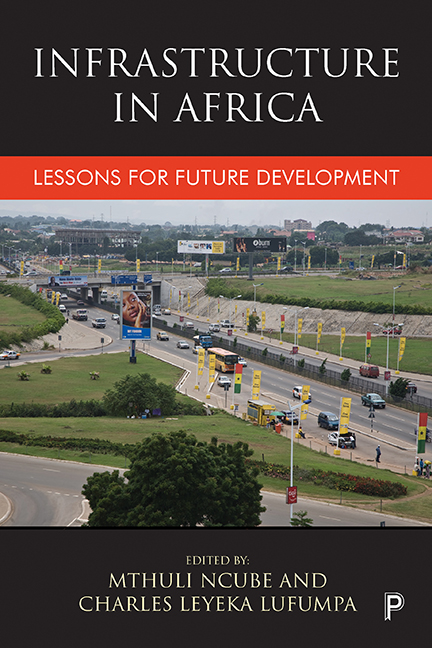Book contents
- Frontmatter
- Contents
- List of figures
- List of tables
- List of boxes
- Notes on contributors
- Acknowledgements
- Foreword
- Introduction: Infrastructure in African development
- Part 1 Spatial and demographic contexts
- Part 2 Sector-specific issues
- Part 3 Regional issues
- Part 4 Financing issues
- Part 5 Concluding remarks
- Index
twelve - Infrastructure deficit and opportunities in Africa
Published online by Cambridge University Press: 05 April 2022
- Frontmatter
- Contents
- List of figures
- List of tables
- List of boxes
- Notes on contributors
- Acknowledgements
- Foreword
- Introduction: Infrastructure in African development
- Part 1 Spatial and demographic contexts
- Part 2 Sector-specific issues
- Part 3 Regional issues
- Part 4 Financing issues
- Part 5 Concluding remarks
- Index
Summary
Introduction
There are huge investment opportunities in Africa, especially in infrastructure, where the benefits are expected to be high. In particular, Africa's absolute and relative lack of infrastructure points to the existence of untapped productive potential could be unlocked through scaling up investments in the sector. Notably, infrastructure plays a central role in improving competitiveness, facilitating domestic and international trade, and enhancing the continent's integration into the global economy. Coupled with better human development outcomes that improve infrastructure promises, the spillover effects and the dynamism that would be generated could support the continent's economic growth and poverty reduction efforts. Similarly, improved infrastructure could help eliminate some of the binding constraints to the realization of the benefits of globalization.
The estimated financing requirement to close Africa's infrastructure deficit amounts to US$93 billion annually until 2020. In as much as this financing requirement is a challenge, African governments have a wide range of policy options that could open new sources of finance. The good news is governments have started exploring opportunities for tapping into private financing, creating new partnerships and reducing wastage in such investments. This strategic shift has come about on the realization that scaling up financing from traditional sources alone would not be adequate to close the infrastructure gap. Also, there is evidence that those countries that have invested strategically in infrastructure are reaping the benefits. It is therefore crucial to open up opportunities to attract new investors as well as exploring new mechanisms for financing infrastructure in Africa.
It is in this context that this chapter attempts to assess Africa's infrastructure gaps and financing requirements to close such gaps. It also identifies financing sources and suggests new sources and financing instruments. This is followed by a brief narrative of the role of the African Development Bank (AfDB) in infrastructure. In concluding, the main message is that efforts by African governments to close the gaps present huge investment opportunities to all types of investors, especially the private sector.
The state of infrastructure supply in Africa
Infrastructure investments in Africa have not kept pace with growth in demand, creating a huge deficit. Less than 45% of the continent's population has access to electricity, less than half of rural population has access to an all-season road and only 5% of agriculture is under irrigation.
- Type
- Chapter
- Information
- Infrastructure in AfricaLessons for Future Development, pp. 545 - 568Publisher: Bristol University PressPrint publication year: 2017



